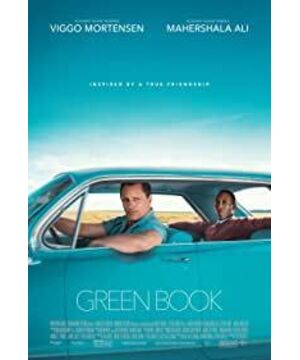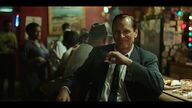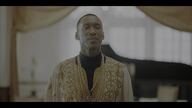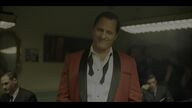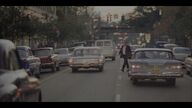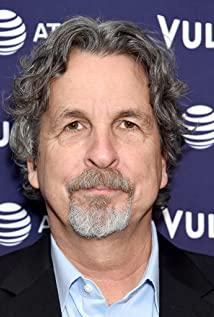Inscription--
The world's full of lonely people afraid to make the first move.
The beginning of the film takes the scene directly into 1962 New York, before Martin Luther King Jr. delivered the speech that is now known around the world. (An extended movie recommendation: "I'm not your negro",
I myself have watched it twice in the archives, the documentary is about the mental journey of black Americans struggling and wandering in history). At the beginning of the movie, some of the characteristics of the protagonist are shown in several details-
Tony - Beating people at the door of a nightclub: Good at and likes to use brute force to solve problems (foreshadowing the conflict in the future); sees his wife drinking water from cups for two black workers at home, and turns the two cups from the two cups. Sink in the trash: Prejudice against black people; will make money by playing small sandwich games: in a lower economic class; making fun of a state's name with women's boobs: disrespectful to women Element. However, although Tony has obvious racial discrimination, it does not affect his intrinsic kindness; joking about women's bodies is actually not harmful, and does not affect his love for his wife and children and his responsibility to the family.
A straight male figure of white supremacy, but essentially a simple and kind person.
Shirley - living in the attic of a gorgeous concert hall, the scene of life directly reflects the dignity of the status; the high price of the hired driver shows that he has a lot of economic strength; being a black man, he does not know much about jazz, which shows that although he has this label , but not in the corresponding circles (and also paved the way for the subsequent outbreak of the heart); the superb skills of piano performance show the extraordinary talent and the higher education received. However, the scenery on the surface is behind the coldness of the heights; the elegance and coldness on the surface also has a very simple heart behind it.
An elegant and decent black figure, but it deserves respect rather than sympathy.
The character setting of the two protagonists in the film is quite dramatic (of course, it may be true in real life, but this article will not discuss it) - not all bad qualities are concentrated in the same person, and not all good ones. Traits are all concentrated in the same person.
So you see, maybe when watching this film, it is obvious that the labels of "white" and "black" and the inherent conflict between them are separated, and the two people are directly regarded as "different" people. There are flaws, or labels that other people call it, there are also bright spots - after all, as Tony said, the world is complicated (The world is complicated). Whether it is the setting of the characters in the movie or the characters in reality, it is impossible to judge a person by simply using one or two labels. The contradiction and fusion of various characteristics detonate some conflict points at certain moments, bringing the plot into a A little climax.
(Some people say that this film reminds me of "Unreachable", because I haven't seen it, so I don't comment. But I think of a Chinese film "Changing Face",
It is about an old grandfather who has a face-changing skill but no grandson and no inheritance. He adopted the grandson with the idea of only passing on the craft to the boy, but he adopted a granddaughter by mistake. Later, he accepted the girl and passed the craft to her The story of the film can also be regarded as a drama film that breaks prejudice. It has some relatively subtle meanings of equality, but the situation and culture are different. Maybe you can think about it in comparison. )
Shirley and Tony each take this step several times in the film ("make the first move"), even violating some of their existing concepts or principles.
For Shirley: eating fried chicken, ending up playing 'black' music with a 'real' black man in a black tavern, hoarding Tony's 'stolen' lucky stone. Fried chicken and black music were the labels that society gave to black people at that time, thinking that as long as black people would do it (of course, this is a typical logical fallacy); and stealing may also be a label that society easily gave black people. In fact, in the final analysis, the manifestations are poverty, lack of culture, and lack of literacy. Shirley's intentional or unintentional performance of not being black, but rather "white", has also become a source of pain for his lack of black identity as a black man. (I recommend another book "Black Skin White Mask",
It is also about how "black" people with dark skin try to keep their words and deeds from being "black" and approach the struggle history of the white class)
As Shirley finally clashed with Tony, after getting out of the car, the sentence that expressed his deep inner troubles and suffering - So if i'm not black enough, and if i'm not white enough, and if i' m not man enough, then tell me, Tony, what am I ?
But what made him take this step?
Is it because of loneliness? Because you need to find a sense of belonging and keep warm? Or because a white man with a different identity accidentally communicated with him spiritually, breaking through some of his psychological barriers.
Shirley is undoubtedly very long. As the core of the trio, he performs on stage and is isolated from the audience; he does not eat fried chicken, does not understand jazz, and is not a poor black man at the bottom. ”, but was isolated by white people; so much that when Tony was sent home on Christmas Eve, the housekeeper was asked to go home, but he sat alone in an empty luxury room... The noble calm on the surface, perhaps the layers of waves in the heart - these waves drive He toured the South and drove him to change something. Even so, he was longly because he didn't let go of the black baggage. I am dark skinned, but my behavior is not "black" - such a presupposition directly affirms the difference and boundary between "black" and "white". And if I am dark skinned and do some "black" behaviors, such as eating fried chicken and talking about jazz, I don't assume that these are related to "black" or have nothing to do with "black", put down the burden, but also there A moment to find a sense of belonging, Shirley - as a soloist, that moment to be with all the black people in the room, no longer isolated. Not because black people should be like this, but because they put down some burdens and took that step.
But in fact, the person who makes move is not just Shirley. Tony too. In the southern state, when driving in the same direction, I met a couple who greeted Shirley with strange eyes, and Tony gave them a middle finger; in the restaurant before the last tour in Birmingham, the manager said it was a history According to the previous regulations, black people are not allowed to enter the dining room, and they also intended to bribe Tony with $100 to convince Shirley to go to other restaurants to eat and perform normally, but Tony refused directly; finally Tony invited Shirley to his house for Christmas.
For Tony, is it because his stereotype of black people has changed that he feels that black people are being treated unfairly? I thought it might not be the case, but because he and Shirley have become a "community" through the reunion of this tour. Because of the existence of this community, whether it's friendship or just the completion of job duties, the main conflict within the character of Tony has shifted. Perhaps the main conflict in the past was the exclusion of black people, but now it is the protection of Shirley.
In fact, Tony's transformation of Shirley is not that great, and there is no need to spread his intentions. Can he break some boundaries with Shirley and break the boundaries with all blacks? Isn't it because of some good qualities in Shirley, not so "black" qualities, such as superb playing technique, maintenance of principle and dignity, calmness in dealing with conflicts, and even helping him write letters (love poems), won Tony's good feeling. Then change to other very "black" black people, okay? Nothing more than this situation made him change some perspectives. Yet sometimes what we need is such a shift in perspective, not necessarily a shift in stereotypes and perceptions (after all, it's too hard, too demanding, too condescending and politically correct).
And maybe the relationship between people goes deep to the micro-perceptual level of the individual, the so-called skin color, wealth, education level, etc., can be weakened. Of course, although the movies and books I recommend above are a lament, perhaps many black people (or disadvantaged groups) will never be able to let go of this burden. Perhaps it comes from the prejudice and malice that many white people or the whole society cannot let go of. But sometimes, just like the story shown in this skit-style movie - let go of the burden, take that step, and no longer carry those heavy and pains, perhaps it is a relief for others and yourself. For Shirley, let go of behaviors that don't appear to be "black"; for Tony, let go of those stereotypes. These moves are essentially a reconciliation with oneself, and in the external society they will also break down barriers and make people feel less lonely. It's not about political correctness, it's about people - even though human nature has a bad side, it also has a simple and kind side.
View more about Green Book reviews


